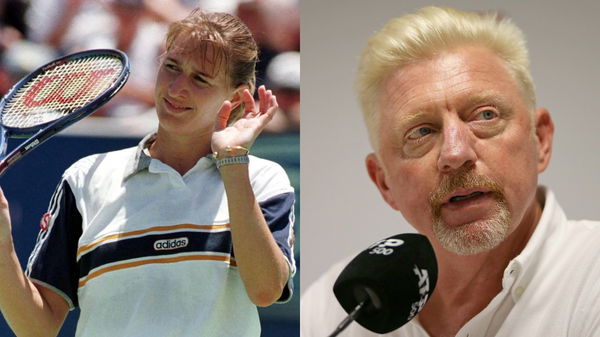
Steffi Graf’s legendary career in tennis was nothing short of extraordinary. With 22 Grand Slam singles titles and a career spanning over a decade, she became one of the most iconic athletes in history. However, when she made the shocking decision to retire at the age of 30 in 1999, it left her fans in disbelief and wondering about the reasons behind such an early exit. Despite her immense success, Graf chose to step away from the sport at the peak of her career, and for many, the question lingered: Why?
Boris Becker, a childhood friend of Graf and a fellow tennis legend, delves into the mystery of her retirement in his autobiography, *The Player*. In his book, Becker offers insight into the internal struggles that led Graf to make this life-altering decision. Though many fans admired her as a tennis machine—cold, focused, and unyielding—Becker reveals a more personal side to Graf’s character that was far from robotic.
A Perfectionist Under Pressure
From an early age, Steffi Graf exhibited a single-mindedness that many found admirable, but also overwhelming. According to Becker, she was “focused and introverted,” often training with a level of intensity that bordered on mechanical. Graf’s “too correct, too cool” demeanor was sometimes seen as distant, as if she were more machine than human. Yet, as Becker points out, this was not just a matter of discipline—it was a reflection of Graf’s natural perfectionism.
Becker paints a picture of a young woman who internalized her competitive drive to the point of self-imposed isolation. “She was too determined for some people’s 
The Weight of Family Scandal
However, Graf’s decision to retire wasn’t just a personal choice driven by ambition and exhaustion. Her family’s turmoil played a significant role in her departure from the sport. One of the most crushing moments in her life came in the late 1990s, when her father, Peter Graf, became embroiled in a major tax scandal.
In 1997, Peter Graf was accused of evading taxes on his daughter’s earnings, amounting to $7.3 million. He was convicted and sentenced to 25 months in prison for his role in the scheme. The scandal, and the subsequent court case, took a profound emotional toll on Steffi. For someone as sensitive and compassionate as Graf, the weight of the scandal was overwhelming. While tennis had once been her escape, it soon became overshadowed by the pressure and heartbreak caused by the family drama.
Boris Becker reveals that despite Steffi’s incredible achievements, the situation had a deep emotional impact. “The tax scandals concerning her father, the court case, and his imprisonment took their toll on Steffi,” he writes. The stress and emotional weight of the situation led Graf to reconsider her relationship with the sport and her career. As Becker notes, Graf’s focus on perfectionism may have masked deeper emotional struggles. However, her public tears following the scandal humanized her in the eyes of the public, giving fans a glimpse into the personal cost of her success.
A Change in Perspective
By the time Graf won her eighth Wimbledon title, she had already begun to contemplate life beyond tennis. While her primary goal had always been to achieve greatness on the court, the emotional toll of the scandals and her father’s imprisonment made her reassess what she truly wanted from life. Becker reflects on a moment where Graf might have thought to herself: *“To hell with my feelings, what I want now is to win Wimbledon for the eighth time.”* This drive, though strong, was ultimately short-lived.
The combination of personal and professional pressures culminated in her decision to step away from the sport. After retiring in 1999, Steffi Graf turned inward, choosing to live a quieter, more private life. She married fellow tennis champion Andre Agassi in 2001, and the couple settled into a more serene existence, away from the spotlight that had once consumed her.
A New Life Beyond Tennis
Retirement allowed Graf to focus on herself and her family. The emotional turmoil that had plagued her during her career began to fade, and her relationship with her father, strained for years due to the tax scandal, was finally mended before his passing in 2013. While Graf’s decision to leave tennis at the peak of her career shocked many, it ultimately allowed her to reclaim her life, free from the pressures of professional sport.
Steffi Graf’s early retirement was not merely a reaction to physical exhaustion or a desire to escape the pressures of her fame. It was a decision shaped by deep personal struggles, including the emotional toll of her father’s actions and the relentless perfectionism that characterized her career. In her quest for excellence, Graf had given everything to tennis, but in the end, it was the toll on her emotional well-being that led her to walk away.
Today, Steffi Graf remains one of tennis’ most revered figures, not only for her sporting achievements but also for the grace with which she navigated the challenges of life beyond the court. As Boris Becker’s revelations demonstrate, her decision to retire may have been one of the most difficult and personal choices of her life, but it was ultimately the step that allowed her to reclaim control of her own narrative.
Leave a Reply